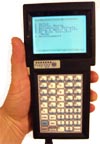 |
 |
Tcl for Embedded Applications |

 |
 |
Tcl for Embedded Applications |

These four procedures all evaluate a string expression, returning the result in one of four different forms. The expression is given by the string argument, and it can have any of the forms accepted by the expr command. The interp argument refers to an interpreter used to evaluate the expression (e.g. for variables and nested Tcl commands) and to return error information. Interp->result is assumed to be initialized in the standard fashion when any of the procedures are invoked.
For all of these procedures the return value is a standard Tcl result: TCL_OK means the expression was succesfully evaluated, and TCL_ERROR means that an error occurred while evaluating the expression. If TCL_ERROR is returned then interp->result will hold a message describing the error. If an error occurs while executing a Tcl command embedded in string, then that error will be returned.
If the expression is successfully evaluated, then its value will be returned in one of four forms, depending on which procedure is invoked. Tcl_ExprLong stores an integer value at *longPtr. If the expression's actual value was a floating-point number, then it is truncated to an integer. If the expression's actual value was a non-numeric string then an error is returned.
Tcl_ExprDouble stores a floating-point value at *doublePtr. If the expression's actual value was an integer, it is converted to floating-point. If the expression's actual value was a non-numeric string then an error is returned.
Tcl_ExprBoolean stores a 0/1 integer value at *booleanPtr. If the expression's actual value was an integer or floating-point number, then Tcl_ExprBoolean stores 0 at *booleanPtr if the value was zero and 1 otherwise. If the expression's actual value was a non-numeric string then an error is returned.
Tcl_ExprString returns the value of the expression as a string stored in interp->result. If the expression's actual value was an integer or floating-point number, then Tcl_ExprString converts it to string (using sprintf with a ``%d'' or ``%g'' converter).
Copyright © 1989-1994 The Regents of the University of California. Copyright © 1994-1996 Sun Microsystems, Inc.